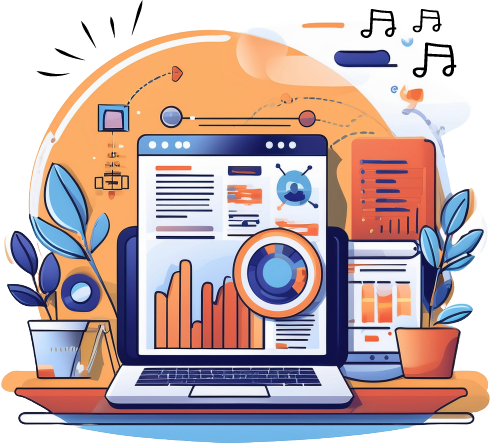3 Jul 2025
How to use social media to drive event registrations and engagement
Social media is one of the most effective tools available to event organisers, but only when used with clear intent and strategy. Many campaigns underperform because they rely on inconsistent messaging, sporadic posting, or a lack of integration with the event website. Done properly, social media can build awareness, drive engagement, fill seats, and give your event long-term reach.
As a web design agency that creates bespoke event websites, we know that social content is only as strong as the destination it leads to. From social-friendly landing pages to embedded feeds and branded share assets, everything needs to connect. Here’s how to do it right.
Start with a strategy, not just a post
Every successful campaign begins with a clear plan. Start by defining:
- Your core audience (job roles, industries, interests)
- The platforms they use (LinkedIn, Instagram, X, Facebook, TikTok)
- Your campaign goals (registrations, brand exposure, sponsor value, community growth)
Map out a social content calendar that aligns with your event timeline. Typical phases include:
- Announcement (save the date, key themes)
- Promotion (early bird pricing, speakers, sessions)
- Engagement (behind the scenes, polls, Q&As)
- Live coverage (day-of content, speaker quotes, audience reactions)
- Post-event (highlights, replays, follow-up CTAs)
We design event websites with social integration in mind, from branded share cards to analytics-friendly URLs, so your campaigns don’t lose momentum between click and conversion.
Use a consistent visual identity
A unified look across platforms builds recognition and trust. Use your event logo, colour scheme, fonts, and tone consistently in all visual assets and captions.
Create templates for:
- Speaker announcements
- Sponsor spotlights
- Agenda highlights
- Countdown posts
- Testimonials
Tools like Canva, Figma, or Adobe Express can streamline this process. As part of our website projects, we can provide you with a tailored social asset toolkit to ensure your brand remains strong and consistent across all channels.
Promote through your community
Social proof is one of the most powerful forms of promotion. Encourage your network, speakers, sponsors, exhibitors, past attendees, and partners, to share your event with their own audiences.
Make it easy for them:
- Provide ready-made post copy and images
- Share trackable links (use UTM codes or bit.ly for tracking)
- Tag them in your own posts to encourage re-sharing
- Create a branded hashtag and encourage usage
We often build dedicated speaker or exhibitor portals into our event websites where partners can access promotional materials and scheduling tools, helping them amplify your reach with less friction.
Use paid promotion wisely
While organic reach is valuable, targeted paid ads can dramatically improve visibility, especially for ticket sales or lead generation.
Recommended formats include:
- LinkedIn sponsored posts for B2B audiences
- Instagram Stories for visual engagement
- Facebook event ads to reach interest-based groups
- Short-form video ads for TikTok or YouTube pre-roll
Boosting posts alone won’t cut it, build tailored ads with strong CTAs and clear landing pages. We ensure your event website supports this with fast-loading, mobile-optimised pages built to convert traffic from any channel.
Optimise your landing pages
No matter how strong your social media post is, the journey breaks if the landing page underperforms. Ensure your site includes:
- A clear headline and value proposition
- Key details (date, location, audience, topics)
- Compelling visuals or video
- Trust signals (speaker logos, testimonials, past attendee stats)
- A clear CTA (register, download, enquire)
We specialise in designing event websites that convert, using data-backed layouts, streamlined registration flows, and integrations with CRM or ticketing systems to capture interest effectively.
Create content before, during, and after the event
A strong campaign doesn’t end when the event begins. Use each phase to keep your audience engaged.
Before the event:
- Speaker intro videos
- Interactive polls and Q&A
- Behind-the-scenes previews
During the event:
- Real-time photos, quotes, and reactions
- Short-form videos from sessions or panel clips
- Speaker shoutouts and sponsor tags
- User-generated content using your hashtag
After the event:
- Highlights video
- Key takeaways carousel
- “Thank you” posts and early interest forms for the next edition
Our event websites often include social media feed integrations, post-event content hubs, and gated replay areas, keeping your campaign active even after the final session closes.
Track what works
Analytics should inform every decision. Most platforms offer performance data, but tracking full-funnel performance means also monitoring what happens on your site after the click.
We implement UTM tracking and set up Google Analytics or GA4 dashboards to monitor:
- Top-performing social channels
- Conversion rates by platform
- Drop-off points on landing pages
- Audience demographics and engagement behaviour
This insight helps refine your messaging, improve ad spend efficiency, and plan better for future campaigns.
Conclusion
Social media is one of the most powerful tools in your event marketing toolkit, but it works best when it’s part of a bigger ecosystem. With the right strategy, consistent branding, and smart integration between your posts and your website, you can turn impressions into registrations and engagement into long-term value.
Want more attendees, ticket sales, or sponsors? It starts with your event website.
Get a free, expert-crafted audit of your event site - see what’s working, what’s broken, and what’s potentially costing you conversions.
Your event website should sell your event, not just describe it.
We’ll audit your site for speed, mobile experience, conversion flow, and more - so you can maximise results before your next launch.


